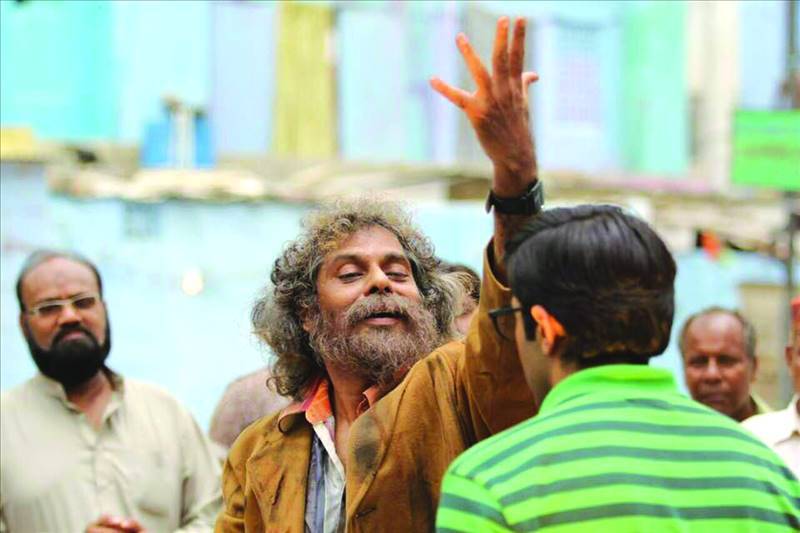
Mohammed Ehteshamuddin is someone who, apart from having given us a variety of performances to enjoy on stage, television and big screen, has also directed works that can be counted among the best of contemporary Pakistani dramas and films.
Ehteshamuddin’s directorial works exude a realism in terms of both content and dialogue, and a relatability that comes from his choice of rustic settings. A keen observer, an avid reader and someone who is not oblivious to the sensitivities of his country, Ehteshamuddin has not only directed stories that are close to our region such as Udaari and Aseer-zaadi, but even as an actor, has always gone for characters that are part and parcel of a society like ours – his recent memorable one being that of a patriarch in Yaqeen Ka Safar.
The Friday Times caught up with the actor, director and writer to ask him some questions.
Muhammad Ali: We know you as an actor, a writer and a director. Which of these is your real calling?
Mohammed Ehteshamuddin: All of these fields are interrelated, and what unites them is the element of story-telling. I therefore consider myself a story-teller who makes use of different mediums for narrating tales. Whichever style of narration clicks me at a certain point in time, I go for it and enjoy it whole-heartedly.
M.A.: With which of these professions did you actually enter the Pakistani showbiz industry?
M.E.: I started with theatrical performances, reciting stories and poems in reading sessions. It was during one such performance that Khalid Ahmed and Sheema Kermani noticed me and roped me in for Tehrik-e-Niswan. From then onwards, I did countless plays with Tehrik-e-Niswan and Katha Group, two of the rebellious groups from theatre who were passionately working despite General Zia-ul-Haq’s attempts at bringing artistic activities to an end. Then it happened that as a result of a collaboration of Pakistan Television (PTV) and the UNDP, a small group of theatre actors was selected and called to the PTV academy to work on some projects and receive further training. Among the selected people were Shahid Shafaat, Sania Saeed, Saif-e-Hassan and I – along with a few others. This is how I shifted from theatre to television. In 2006, I left my job at Sui Southern Gas Company and decided to work on my passion, as a result of which I made many independent short films including Shahrukh Khan Ki Maut, Mein Sawa Paanch Bajay Aayi Thi and a couple of others based on the stories of canonical Urdu language writers. While Shahrukh Khan Ki Maut made it to almost 10 international film festivals and Mein Sawa Paanch Bajay Aayi Thi made it to Iran, two of my works from Partition Stories, i.e. Mukti and Yeh Hindustan Woh Pakistan also made it to INPUT Festival. These two were creations of Beyond Borders, a production house established by Najam Sethi, for which I made directorial works under the supervision of Khalid Ahmed. It was after making all of these single plays that I moved towards serials as a freelance director.
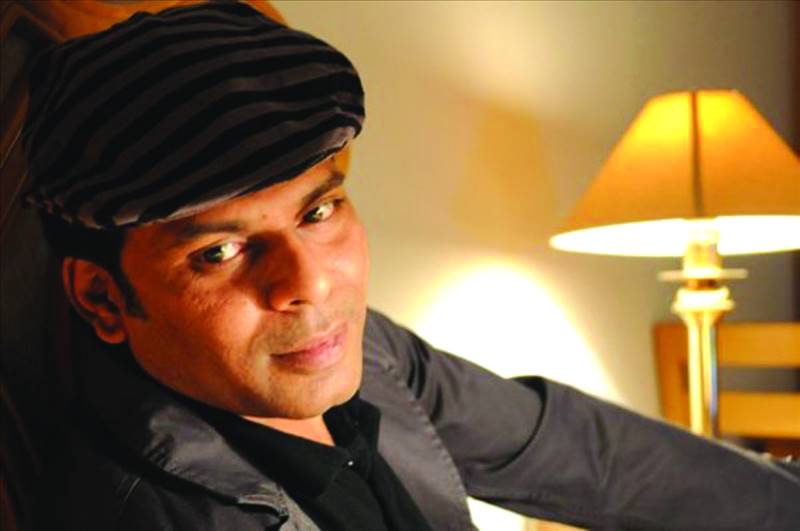
M.A.: In most of your directorial works, your settings have been simple and rustic. Why is that so?
M.E.: Most of the times, it had to do with the scripts I was working on, many of which were period plays. In Sadqe Tumhare, I had to take the audience to the era of the 1980s and in Aangan, I had to make them walk through the pre-Partition Subcontinent. That is what called for simple and rustic settings. However, I personally am also inclined towards stories that have emerged from our own region, even if they are old. I believe that what attracts people is either the past or the future, because the present is something they are already witnessing. Therefore, I try to work on stories that have a nostalgic element in them.
M.A.: You have directed a lot of Partition stories, in the form of both short films and serials. What attracts you the most in Partition Literature?
M.E.: While I have read a lot of Partition Literature, I have also listened to first-hand accounts of Partition victims, for I grew up in the company of many of them. They got uprooted from their homelands, went through a large-scale migration and suffered through a division that was not merely geographical, but mental as well. The drastic changes their lives went through is something that renders them people with painful yet very important stories to tell. That is why I feel the need to narrate stories of the Subcontinent’s partition, as they carry so much in them.
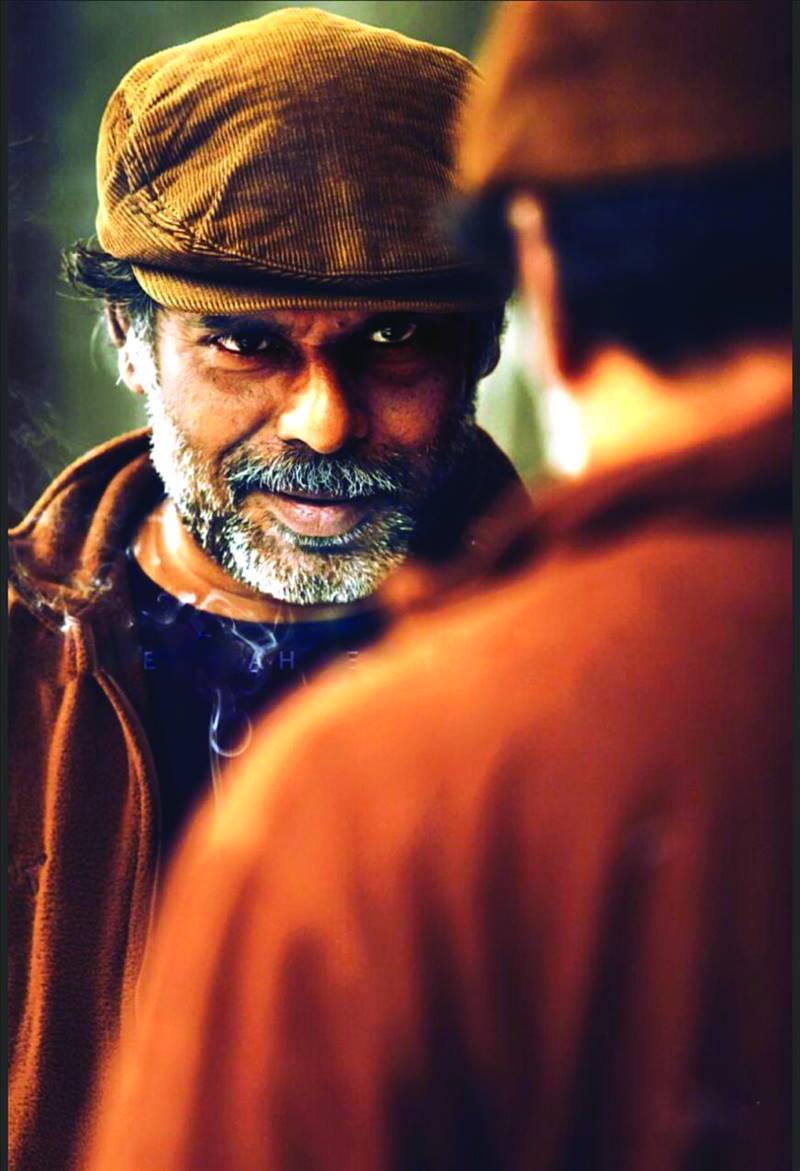
M.A.: After having directed a serial based on Khadija Mastoor’s Aangan, do you plan to adapt Zameen, which is considered a figurative serial to Aangan?
M.E.: I had done it had I been a producer, but not all things are in your own hands. You have to listen to what the channels demand from you. However, it was decided that Aangan would have follow-ups by the names of Angan 2 and Aangan 3, each being a continued thread of the previous season and covering eras in a chronological sequence, from Partition till today. The writer was also supposed to be Mustafa Afridi, who dramatized Aangan. Let’s see what fate has in store for us.
M.A.: Since you are both a writer and a director, how does the process of drama direction take place in your case? Do you take your own stories to channels or are you given scrips to direct?
M.E.: It’s a two-way process. In the case of Aseer-zaadi, I took the story to Momina Duraid, while Sadqe Tumhare was handed over to me by her. Preet Na Kariyo Koi written by Amna Mufti had been lying in the office for quite a long time after having been rejected multiple times by various channels. When I came across the script, I felt it to be the need of the time and insisted that I be allowed to work on it. Fortunately, I was given the permission and I directed it, choosing Ahsan Khan and Hira Mani as the cast members. When it came to Udaari, I was approached by Momina once again and I agreed because of the importance of the issue it addressed.
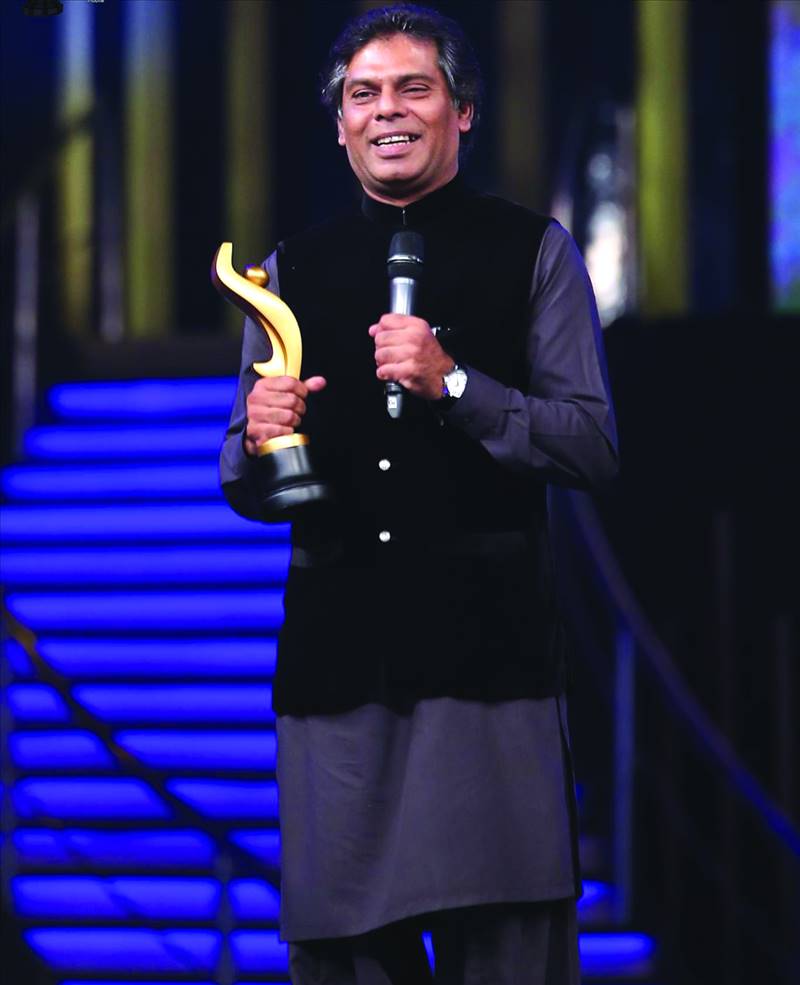
M.A.: Being a writer yourself, do you have clashes with the writers whose scripts you dramatize?
M.E.: I haven’t had any clash uptil now, as mutual consultation always takes place and directors are in constant touch with the writers. When it comes to minor changes, the director is free to work, considering that a script’s execution for the screen is an entirely different job from writing the script and therefore depends on the director. However, if major changes need to be made, then the writers are approached again and are asked to tweak the story where needed.
M.A.: What were the main challenges while directing Udaari, considering that it was quite bold a script?
M.E.: Instead of the word “bold”, I would go for the word “true”. What Udaari told was true, no matter how bitter, and it needed to be told at any cost because child abuse is something with which our country’s future is linked. We needed a lot of courage to speak on that matter, but we did it with the belief that the truth is what always wins. We took care to keep it as realistic as possible and not turn it into something vulgar. Ahsan Khan too, was a bit worried, but worked very hard on his character. We did find it a bit difficult to shoot scenes of abuse with the child-star but we succeeded in doing that by teaching the girl about harassment and its nuances such as “good and “bad” touch instead of just treating her like a simpleton left on her own to construe what was happening. Thankfully, people watched Udaari with families and it turned out to be a huge success.
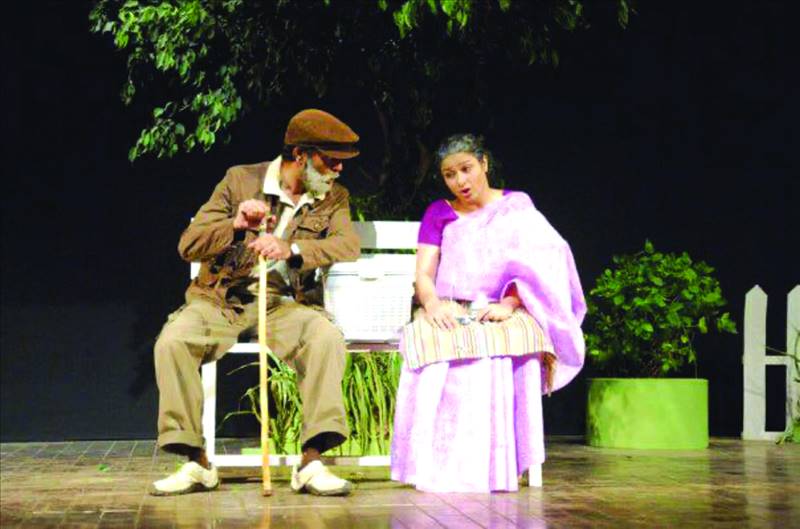
M.A.: You acted in the film Chambeli when the Pakistani film industry was taking its initial steps towards revival, and recently you directed your own film, Superstar. What do you think was lacking in the initial efforts which you tried to cover up when film direction came into your own hands?
M.E.: There was nothing wrong with Chambeli as such. It was a beautiful effort, directed by Ismail Jilani and written and produced by Shahzad Nawaz, and incorporated real-life characters with relatable attributes. The only problem that it faced was that it should have been released at least four weeks prior to the elections, as it revolved around the themes of voting rights and the thinking process it entails. I became a part of it as I gave an audition for it and got selected. One of my reasons to perform in the film, apart from its amazing script, was to see how the big screen and its nuances work, and it did help me a lot in learning. Chambeli was a wonderful experience which educated me in every way it could.
M.A.: Have you made your dream project or is it still under-way?
M.E.: I believe that humans dream every day, and therefore every project is a dream project. I don’t think it’s fair to keep one project in mind as a dream project and treat other creative works in an off-hand manner. I do one project at a time, and do it whole-heartedly. So, for me, every project is a dream project and carries equal importance.
M.A.: Which has been your personal favourite work when it comes to acting?
M.E.: I give my heart and soul to everything I do, and treat all of my works as I would my children, be they related to acting, writing or direction. Every project that I have done has given me happiness and has taught me something. I loved playing Moosa in Chambeli and also the cruel father in Yaqeen Ka Safar. So, I have had no bad experience until now because of my complete involvement in all of my projects.
M.A.: Have you ever come across any negative criticism? If so, what is your way of dealing with it?
M.E.: I believe in extracting positivity from negativity. One should always try to probe into the reasons for a project’s failure and try to improve. Criticism is inevitable because people out there belong to different mindsets and not everything is liked by everyone. The initial criticism that I faced was that I do dark projects. While those dark projects did have an audience and were not entirely eclipsed directorial pieces, I did try to change myself in accordance with the channels and viewers’ demands and went for commercial, brightly directed drama serials. But yes, criticism should always be done very carefully, for it has the tendency to both build and shatter people’s confidence. It should always be positive and targeted towards taking a person towards improvement.
M.A.: What is that one thing on which you do not compromise as a director?
M.E.: I never like my projects to be stopped in the middle. No matter what the conditions are, I take care not to lose my focus and only get up when I am entirely done with the project. I have never left any of my projects mid-way.
M.A.: With the rise of web-series, do you plan to go for the medium any time soon?
M.E.: My focus these days is more on new concepts than on the medium for their execution. Let’s see how things turn out for these ideas, which might either turn them into television serials or web-series.
M.A.: A portion of our society keeps comparing our drama industry’s past with its present. What is your usual stance in such cases?
M.E.: More than the statements on the content, what comes as disappointing to me is the way some people continuously snub the younger lot of creative artists and treat them as if they do not know anything. This should not be the case. Being an instructor as well, I have come across so many young people who have novel ideas, quite apt according to the modern era. We need to understand them and the times they are living in, instead of remaining bent upon comparing them with senior artists. We have highly talented people with a lot of potential which should be respected.
M.A.: Tell us about your upcoming projects.
M.E.: After Superstar, my next project is also a film that I have directed, titled Dum Mustam. It’s almost completed and only a few days of work are left.
Muhammad Ali is an M.Phil scholar and a former visiting lecturer at GCU, Lahore. His interest lies in indigenous literature, the specific research areas being the Partition novel, Environmental Literature emerging from South Asia and classical and contemporary Pakistani television drama. His research on Sahira Kazmi’s “Zaib un Nisa” which was a part of his graduation thesis has been presented on various platforms including Olomopolo Media. This interview is a part of a series of interviews in which various Pakistani celebrities including writers, actors and directors will be asked questions regarding their professional work. The writer can be reached at m.ali_aquarius85@yahoo.com.
Ehteshamuddin’s directorial works exude a realism in terms of both content and dialogue, and a relatability that comes from his choice of rustic settings. A keen observer, an avid reader and someone who is not oblivious to the sensitivities of his country, Ehteshamuddin has not only directed stories that are close to our region such as Udaari and Aseer-zaadi, but even as an actor, has always gone for characters that are part and parcel of a society like ours – his recent memorable one being that of a patriarch in Yaqeen Ka Safar.
The Friday Times caught up with the actor, director and writer to ask him some questions.
***
Muhammad Ali: We know you as an actor, a writer and a director. Which of these is your real calling?
Mohammed Ehteshamuddin: All of these fields are interrelated, and what unites them is the element of story-telling. I therefore consider myself a story-teller who makes use of different mediums for narrating tales. Whichever style of narration clicks me at a certain point in time, I go for it and enjoy it whole-heartedly.
M.A.: With which of these professions did you actually enter the Pakistani showbiz industry?
M.E.: I started with theatrical performances, reciting stories and poems in reading sessions. It was during one such performance that Khalid Ahmed and Sheema Kermani noticed me and roped me in for Tehrik-e-Niswan. From then onwards, I did countless plays with Tehrik-e-Niswan and Katha Group, two of the rebellious groups from theatre who were passionately working despite General Zia-ul-Haq’s attempts at bringing artistic activities to an end. Then it happened that as a result of a collaboration of Pakistan Television (PTV) and the UNDP, a small group of theatre actors was selected and called to the PTV academy to work on some projects and receive further training. Among the selected people were Shahid Shafaat, Sania Saeed, Saif-e-Hassan and I – along with a few others. This is how I shifted from theatre to television. In 2006, I left my job at Sui Southern Gas Company and decided to work on my passion, as a result of which I made many independent short films including Shahrukh Khan Ki Maut, Mein Sawa Paanch Bajay Aayi Thi and a couple of others based on the stories of canonical Urdu language writers. While Shahrukh Khan Ki Maut made it to almost 10 international film festivals and Mein Sawa Paanch Bajay Aayi Thi made it to Iran, two of my works from Partition Stories, i.e. Mukti and Yeh Hindustan Woh Pakistan also made it to INPUT Festival. These two were creations of Beyond Borders, a production house established by Najam Sethi, for which I made directorial works under the supervision of Khalid Ahmed. It was after making all of these single plays that I moved towards serials as a freelance director.

“I did countless plays with Tehrik-e-Niswan and Katha Group, two of the rebellious groups from theatre who were passionately working despite General Zia-ul-Haq’s attempts at bringing artistic activities to an end”
M.A.: In most of your directorial works, your settings have been simple and rustic. Why is that so?
M.E.: Most of the times, it had to do with the scripts I was working on, many of which were period plays. In Sadqe Tumhare, I had to take the audience to the era of the 1980s and in Aangan, I had to make them walk through the pre-Partition Subcontinent. That is what called for simple and rustic settings. However, I personally am also inclined towards stories that have emerged from our own region, even if they are old. I believe that what attracts people is either the past or the future, because the present is something they are already witnessing. Therefore, I try to work on stories that have a nostalgic element in them.
M.A.: You have directed a lot of Partition stories, in the form of both short films and serials. What attracts you the most in Partition Literature?
M.E.: While I have read a lot of Partition Literature, I have also listened to first-hand accounts of Partition victims, for I grew up in the company of many of them. They got uprooted from their homelands, went through a large-scale migration and suffered through a division that was not merely geographical, but mental as well. The drastic changes their lives went through is something that renders them people with painful yet very important stories to tell. That is why I feel the need to narrate stories of the Subcontinent’s partition, as they carry so much in them.

M.A.: After having directed a serial based on Khadija Mastoor’s Aangan, do you plan to adapt Zameen, which is considered a figurative serial to Aangan?
M.E.: I had done it had I been a producer, but not all things are in your own hands. You have to listen to what the channels demand from you. However, it was decided that Aangan would have follow-ups by the names of Angan 2 and Aangan 3, each being a continued thread of the previous season and covering eras in a chronological sequence, from Partition till today. The writer was also supposed to be Mustafa Afridi, who dramatized Aangan. Let’s see what fate has in store for us.
M.A.: Since you are both a writer and a director, how does the process of drama direction take place in your case? Do you take your own stories to channels or are you given scrips to direct?
M.E.: It’s a two-way process. In the case of Aseer-zaadi, I took the story to Momina Duraid, while Sadqe Tumhare was handed over to me by her. Preet Na Kariyo Koi written by Amna Mufti had been lying in the office for quite a long time after having been rejected multiple times by various channels. When I came across the script, I felt it to be the need of the time and insisted that I be allowed to work on it. Fortunately, I was given the permission and I directed it, choosing Ahsan Khan and Hira Mani as the cast members. When it came to Udaari, I was approached by Momina once again and I agreed because of the importance of the issue it addressed.

M.A.: Being a writer yourself, do you have clashes with the writers whose scripts you dramatize?
M.E.: I haven’t had any clash uptil now, as mutual consultation always takes place and directors are in constant touch with the writers. When it comes to minor changes, the director is free to work, considering that a script’s execution for the screen is an entirely different job from writing the script and therefore depends on the director. However, if major changes need to be made, then the writers are approached again and are asked to tweak the story where needed.
M.A.: What were the main challenges while directing Udaari, considering that it was quite bold a script?
M.E.: Instead of the word “bold”, I would go for the word “true”. What Udaari told was true, no matter how bitter, and it needed to be told at any cost because child abuse is something with which our country’s future is linked. We needed a lot of courage to speak on that matter, but we did it with the belief that the truth is what always wins. We took care to keep it as realistic as possible and not turn it into something vulgar. Ahsan Khan too, was a bit worried, but worked very hard on his character. We did find it a bit difficult to shoot scenes of abuse with the child-star but we succeeded in doing that by teaching the girl about harassment and its nuances such as “good and “bad” touch instead of just treating her like a simpleton left on her own to construe what was happening. Thankfully, people watched Udaari with families and it turned out to be a huge success.

M.A.: You acted in the film Chambeli when the Pakistani film industry was taking its initial steps towards revival, and recently you directed your own film, Superstar. What do you think was lacking in the initial efforts which you tried to cover up when film direction came into your own hands?
M.E.: There was nothing wrong with Chambeli as such. It was a beautiful effort, directed by Ismail Jilani and written and produced by Shahzad Nawaz, and incorporated real-life characters with relatable attributes. The only problem that it faced was that it should have been released at least four weeks prior to the elections, as it revolved around the themes of voting rights and the thinking process it entails. I became a part of it as I gave an audition for it and got selected. One of my reasons to perform in the film, apart from its amazing script, was to see how the big screen and its nuances work, and it did help me a lot in learning. Chambeli was a wonderful experience which educated me in every way it could.
M.A.: Have you made your dream project or is it still under-way?
M.E.: I believe that humans dream every day, and therefore every project is a dream project. I don’t think it’s fair to keep one project in mind as a dream project and treat other creative works in an off-hand manner. I do one project at a time, and do it whole-heartedly. So, for me, every project is a dream project and carries equal importance.
M.A.: Which has been your personal favourite work when it comes to acting?
M.E.: I give my heart and soul to everything I do, and treat all of my works as I would my children, be they related to acting, writing or direction. Every project that I have done has given me happiness and has taught me something. I loved playing Moosa in Chambeli and also the cruel father in Yaqeen Ka Safar. So, I have had no bad experience until now because of my complete involvement in all of my projects.
M.A.: Have you ever come across any negative criticism? If so, what is your way of dealing with it?
M.E.: I believe in extracting positivity from negativity. One should always try to probe into the reasons for a project’s failure and try to improve. Criticism is inevitable because people out there belong to different mindsets and not everything is liked by everyone. The initial criticism that I faced was that I do dark projects. While those dark projects did have an audience and were not entirely eclipsed directorial pieces, I did try to change myself in accordance with the channels and viewers’ demands and went for commercial, brightly directed drama serials. But yes, criticism should always be done very carefully, for it has the tendency to both build and shatter people’s confidence. It should always be positive and targeted towards taking a person towards improvement.
M.A.: What is that one thing on which you do not compromise as a director?
M.E.: I never like my projects to be stopped in the middle. No matter what the conditions are, I take care not to lose my focus and only get up when I am entirely done with the project. I have never left any of my projects mid-way.
M.A.: With the rise of web-series, do you plan to go for the medium any time soon?
M.E.: My focus these days is more on new concepts than on the medium for their execution. Let’s see how things turn out for these ideas, which might either turn them into television serials or web-series.
M.A.: A portion of our society keeps comparing our drama industry’s past with its present. What is your usual stance in such cases?
M.E.: More than the statements on the content, what comes as disappointing to me is the way some people continuously snub the younger lot of creative artists and treat them as if they do not know anything. This should not be the case. Being an instructor as well, I have come across so many young people who have novel ideas, quite apt according to the modern era. We need to understand them and the times they are living in, instead of remaining bent upon comparing them with senior artists. We have highly talented people with a lot of potential which should be respected.
M.A.: Tell us about your upcoming projects.
M.E.: After Superstar, my next project is also a film that I have directed, titled Dum Mustam. It’s almost completed and only a few days of work are left.
Muhammad Ali is an M.Phil scholar and a former visiting lecturer at GCU, Lahore. His interest lies in indigenous literature, the specific research areas being the Partition novel, Environmental Literature emerging from South Asia and classical and contemporary Pakistani television drama. His research on Sahira Kazmi’s “Zaib un Nisa” which was a part of his graduation thesis has been presented on various platforms including Olomopolo Media. This interview is a part of a series of interviews in which various Pakistani celebrities including writers, actors and directors will be asked questions regarding their professional work. The writer can be reached at m.ali_aquarius85@yahoo.com.

